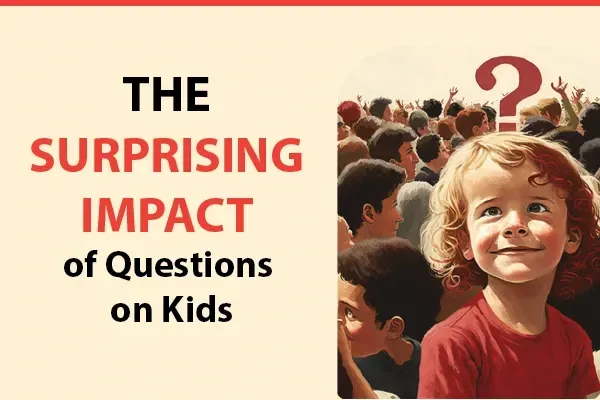
The Surprising Impact of Questions on Kids: Insights from Harvard's Study
The Amazing Impact of Questions in Kids' Education: What Studies Tell Us
Have you ever thought about how the questions you ask your kids could be affecting their education and growth?
Well, it might come as a surprise, but the kind of questions we ask and how often we ask them can make a big difference.
In this blog, we'll talk about the amazing impact of questions in kids' education and how different studies show the benefits for our children.
🌈 According to a study done at Harvard, asking open-ended questions can help kids think deeper and solve problems.
Open-ended questions are ones that can't be answered with just a yes or no.
On the other hand, yes or no questions can limit a kid's thinking and make it harder for them to be creative.
When we ask open-ended questions, kids have the chance to think beyond basic answers and express their own thoughts and ideas.
This makes them more interested and involved in their own education.
🌈 A study at Stanford University found that asking questions can also lead to more teamwork and cooperation among kids.
When kids are encouraged to ask their own questions, it makes them more curious and interested in the world around them.
Working with others to find answers helps kids develop important social and communication skills too.
🌈 A report from the National Association for the Education of Young Children showed that asking questions can make kids love learning.
The report found that when kids are asked questions that challenge their thinking and spark their curiosity, they are more likely to want to keep learning for the rest of their lives.
The way we ask questions is also important.
If we ask questions in a supportive and non-judgmental way, kids will feel safe to share their thoughts and ideas. But, if we ask questions in a critical or negative way, it can stop kids from wanting to participate in their own education.❌
By using questions when teaching and learning, educators and parents can help kids love learning, think critically, and work together with others. Let's take advantage of the power of questions and help shape the next generation into curious and confident learners.💥
It's important to remember that the age and developmental stage of the child should also be considered when asking questions.
Young kids might not be able to think critically as well as older kids and might need simpler questions. Older kids might benefit from more complex and thought-provoking questions.
Asking different kinds of questions, like factual questions, creative questions, and evaluative questions, can keep kids interested and engaged.
🌈 And, a study from the University of Cambridge found that kids who were asked a lot of questions did better in school than kids who were asked fewer questions.
This shows that asking questions consistently and on purpose can have a positive impact on kids' learning and performance.
Questions to ask and Questions to Avoid:
When asking questions to children, it's important to consider the type and approach of the questions. Here are some guidelines for what questions to ask and which ones to avoid:
Questions to ❤️ ask:
Open-ended questions: Encourage children to think deeply and share their thoughts and ideas. Examples include: "What did you learn today?" or "What do you think about this?"
Creative questions: Spark imagination and creativity. Examples include: "What would happen if...?" or "How could you solve this problem?"
Evaluative questions: Encourage critical thinking and reflection. Examples include: "What did you like or dislike about this?" or "What could be improved?"
Factual questions: Help children build their knowledge base. Examples include: "Who is the author of this book?" or "What is the capital of this country?"
Questions to ❌ avoid:
Yes or no questions: Limit children's thinking and stifle creativity. Examples include: "Did you like this?" or "Is this true?"
Overly critical or negative questions: Create a negative environment and hinder a child's willingness to participate. Examples include: "Why did you get this wrong?" or "Why can't you do this correctly?"
Leading questions: Influence children's answers and don't allow for independent thinking. Examples include: "Did you have fun at the park?" (with the assumption that the child did have fun)
Incorporating a variety of question types, using a supportive and non-judgmental approach, and considering the child's age and developmental stage can help to create an optimal environment for children's learning and growth.
support@mykidentrepreneur.com

